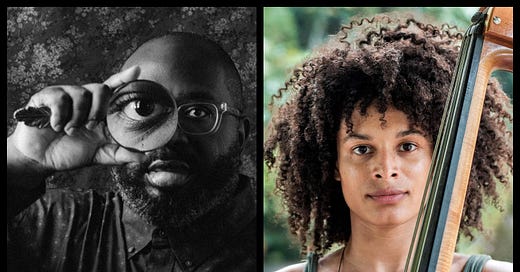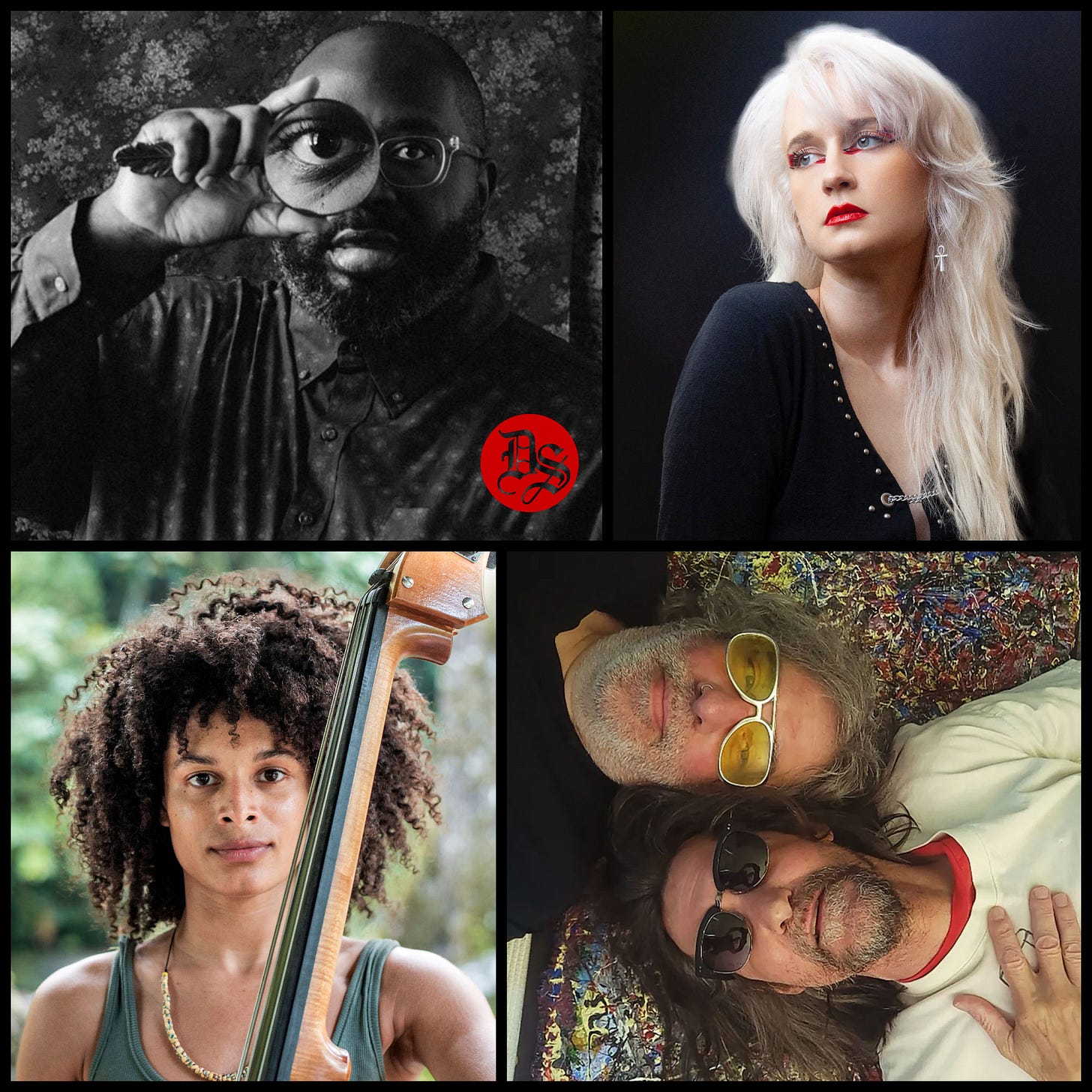The Pan-Caribbean Identity Songbook | Bklyn Sounds 11/21/2024—11/26/2024
FourOneOne's 'Transatlantik' program presents new sonic ideas of Créolité + This Week's Shows Include: Darius Jones / 'Italomatic' / Souled American / Nate Harrison's "Can I Get an Amen?" / more
The Caribbean has been at the center of New York’s cultural identity almost as long the city has recognized itself as a cultural capital. Many in the city’s immigrant population are either from the islands, or descendants. But outside of the annual West Indian Day carnival, it feels like each community exists in its own separate world, divided by tradition, language or status class.
Which makes a sad kind of sense, and yet the notion of a pan-Caribbean identity—one that reflects shared effects of colonialism and the African diaspora’s reach, while feeding the critical understanding practiced by the region’s great writers and thinkers—is now almost a century old. Those ideas had their effect on New York. The Négritude movement, developed by Martinician poet Aimé Césaire as a student in 1930s Paris, helped reframe Blackness in colonial history, and influenced the Harlem Renaissance, and fellow Martinique student Frantz Fanon, as well as the many artists of color indebted to surrealism, who worked to undercut the white gaze (Primitivism!) with specifics about cultural meaning and history. Then in the 1970s and ‘80s, the literary concept Créolité became a lens through which to consider the fluid culture-mixing that was natural to a region colonialism turned into a global melting pot.
Unsurprisingly, such notions of Caribbean identity have been embraced by musicians who grew up in the islands, or in their shadows. The musicians share its rhythms and tools, its melodies and stories, and most of all, a standing question of how to define their personal space in the modern world. This question is the sound at the heart of Transatlantik, a rich two-day program produced by the nonprofit organization FourOneOne, which will take place in various venues around Greenwich Village on Friday, November 22nd and Saturday November 23rd.
Friday’s concert features the New York debut of French-Martinique bassist/vocalist Sélène Saint Aimé, playing her “Creole Songs” songbook, as well as a set by Haitian ceremonial drummer Renald St. Juste. Saturday’s concert will include Cuban pianist Aruan Ortiz’s multi-disciplinary work, Reimagining Tropiques: Then and Now, with vocalist Anaïs Maviel and cellist Aliya Ultan; it’s based on Tropiques, a literary journal that Aimé Césaire and his wife Suzanne founded in the 1940s, and which became a leading voice of négritude, surrealism and future-créolité ideas. Also on Saturday's bill is KāFOU, a nouveau kreyol ambient collaboration between Haiti-born “SoundChemist” Val Jeanty and New Orleans harpist Cassie Watson Francillon. There will also be a Saturday afternoon conversation with the musicians, and Patrick Chamoiseau, a Martinican author who is a leading créolité theorist; and a Saturday night after-party.
Speaking to 34 year-old Saint Aimé and 51 year-old Ortiz, respected musicians whose careers have blossomed within the greater global jazz tradition, it is curious to hear how their approaches to pan-Caribbean identity both overlap and differ.
Ortiz, who trained in the jazz-piano tradition (he counts AACM’s Muhal Richard Abrams a mentor), describes Reimagining Tropiques as a suite of history, characters and events, a study of how the Césaires brought in “integrated a Caribbean reality as a primary source of information.” Yet Ortiz admits that his work also regularly falls back on personal reinterpretations and experiences. Born in Santiago de Cuba, on the island’s southeastern coast, which has long-standing local Haitian roots, he’s been a world-class concert pianist for over two decades, having internalized everything from bop masters to modernist composers. He’s also been working directly with Caribbean narratives for nearly 15 years, integrating them into the fabric of his avant-jazz improvisations. For Ortiz, local identity doesn’t only emanate from the old and the folkloric, but how individuals take the culture in, and then filter it through their own narratives.
“I deal with the conscious but also with the unconscious, without framing it, without restraint. How could I deal with the melodies? How could I fragment the music? How could I use some materials and decontextualize it? Everything is based on who I am,” says Ortiz in a quickfire stream of words. “That's something Muhal told me. ‘Go inside you, then take it out. Inform your work, educate your work—you are who you are, and that's it. Keep the way that you see your experience connected to the foundation of who you are with your culture. Then expand it from there.’”
In a different part of her career and a generation removed from her father’s Martinique, Saint Aimé applies an approach to identity that she calls “the journey back.” With two wondrous folk-jazz albums under her belt, she sowed seeds of the current “Creole Songs” while trying to build a traditional music repertoire in Martinique. Though that project failed, it set her on a path to finding more songs, a path emboldened during a residency in New Orleans, America’s capital of French Antilles and Creole culture. In NOLA, she made acquaintances with the historian Freddi Williams Evans, and with Bruce “Sunpie” Barnes, a chief of the North Side Skull & Bones Mardi Gras gang, both of whom introduced Saint Aimé to Louisiana Creole songs, growing the idea of what she was taking on. She also picked up a band in New Orleans.
For Saint Aimé “Creole Songs” is an ever-expanding self-educational project: meeting new members of a global diaspora, creating and taking on new material (she’s writing string quartets based on traditional music), and because her father refused to teach her Creole, even learning a language of her ancestors so that she can pass it on to her child.
And at a moment when concepts of négritude and créolité born and developed in Martinique—the words of the Césaires, Fanon, and of the poet/writer Édouard Glissant, among others—are again being considered around the world, Saint Aimé’s New York debut invokes for her another kind of journey back.
“It's interesting: I know the Caribbean is greatly represented in New York. But Martinique and Guadalupe, the French Caribbean, don't really have a connection with today’s New York. I feel like it's really interesting that some people are now looking [towards those writers], because there were a lot of amazing thinkers in Martinique. It was—and still is—a place of ideas. And America, New York in particular, had a large influence on those Black thinkers from Martinique who migrated to Paris. So I feel like it's overdue that these exchanges finally go both ways.” She adds, “I'm tripping out when I see Suzanne Cesaire’s name in New York.”
Transatlantik (Fri 11/22 & Sat 11/23 @ Greenwich House Music School, CARA and Francis Kite Club, Manhattan - $15-$25)
This Week’s Shows:
Alto saxophonist, composer and mentor to numerous great young musicians in Bklyn, Darius Jones is getting some well-deserved uptown flowers with performances of two recently composed suites. “Samesoul Maker,” a work long in development, is a gorgeous piece for voices, bells and vibraphone which sounded magnificent when it premiered in current form at Roulette last year (the video above). That premiere took place around the time fLuXkit Vancouver (its suite but sacred) was released to mighty critical acclaim. Darius is one of the best we got right now. Highest Recommendation! (Thurs 11/21, 7:30p @ Kaufman Music Hall, Upper West Side - $30)
I was lucky enough to be around Nate Harrison when he was researching and recording “Can I Get an Amen?” at Cal Arts in 2004-05. It’s an art-archival project that became a private-press 12” about how one drum break (The Winstons’ “Amen, Brother”) became the cornerstone sound of jungle/drum’n’bass. A few years later, it went viral, helping seed an online cottage industry of music-critical thinking about historical sounds. Now that 12” is 20 years old, so Harrison and Textual Record are hosting an anniversary-edition record release party and listening session. If you’re of a particular music-nerd stripe, you probably should not miss this. (Thurs 11/21, 7:30p @ Francis Kite Club, Loisaida - FREE)
CONVERSATION + MUSIC: The Giorno Poetry System’s Arto Lindsay Talks and Plays with Melvin Gibbs program brings together two of downtown music’s longest serving, sonically adventurous and stylistically empathetic giants. Brazilian-American guitarist Lindsay and Bklyn bassist Gibbs are also long-time collaborators, who are great at crafting yarns. This has the potential for a remarkable evening of stories and songs. (Thurs 11/21, 8p @ Giorno Poetry Systems, Bowery - $20)
The Italomatic crew (Andi Synthicide, Facets and Rok One) continue their party’s Italo-disco-and-adjacent-drum-machine-beats march into bigger rooms, this time landing at Public Records to celebrate a new remix (see above). They’re sharing the evening with one of the city’s premiere disco bands, Midnight Magic, who will be playing a live set. (Thurs 11/21, 8p @ Public Records, Gowanus - $25)
A pairing of heavy duty improvising trios under the banner of Folk Music at the great anarchist book store/education center. One trio features trumpeter Nate Wooley, drummer Ches Smith and multi-instrumentalist Chris Corsano, a recipe for noisy discordance and philosophical abstraction. The other brings together regular collaborators, guitar/banjo player Webb Crawford and saxophonist Michael Foster, with bassist Brandon Lopez, and has a greater chance of approaching the traditional definitions of “folk.” (Fri 11/22, 6p @ Property Is Theft, Williamsburg - $15)
DIGITAL ART + SOUND: Corpus is an evening of software-based improvisational performances presented by Ben Shirken (a.k.a. producer Ex Wiiish, a.k.a. synth player in NuJazz, a.k.a. founder of 29 Speedway), at a Chinatown gallery space. Performers/artists include Tommy Martinez, Axine M, and Karol Konstancia. All performances are aligned with the gallery’s current group show, “Speak Ill” group show, and will use sculptor Emmett Palaima’s Morningstar speakers as a conduit and amplifier. (Fri 11/22, 7p @ Blade Study, Chinatown - FREE with RSVP)
Keep reading with a 7-day free trial
Subscribe to Dada Strain to keep reading this post and get 7 days of free access to the full post archives.



